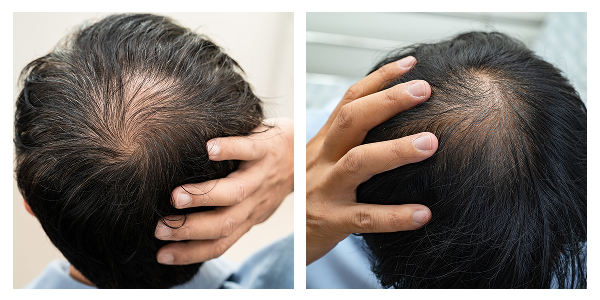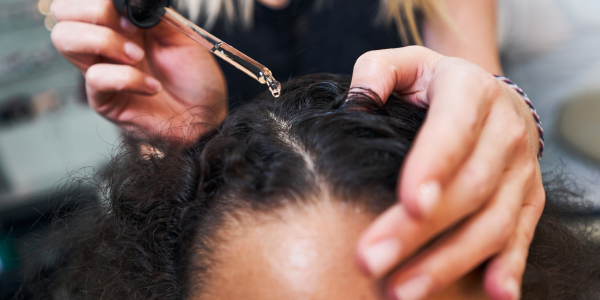
Hair loss affects millions of people worldwide, with various treatment options available to help combat this common concern.

When considering hair loss treatments, two primary approaches dominate the market: topical applications such as hair loss spray and systemic treatments like hair loss tablets.
Understanding the fundamental differences between these treatment methods is crucial for making an informed decision about which approach best suits your individual needs and circumstances.
Both hair spray for hair loss and tablets for hair loss have their unique advantages and considerations. Topical treatments work directly on the scalp, whilst oral medications work throughout the body’s systems.
This comprehensive guide will explore the key differences between these two approaches, helping you understand which treatment method might be most suitable for your hair loss journey.
How Hair Loss Sprays Work vs How Hair Loss Tablets Work
Hair loss spray treatments work through direct topical application to the affected areas of the scalp. These solutions typically contain active ingredients such as minoxidil, finasteride, or combination formulations that are absorbed through the skin.
The Double Action Hair Loss Spray, for instance, combines minoxidil and finasteride to target male pattern baldness directly at the source. Minoxidil increases blood flow to hair follicles, providing essential oxygen and nutrients that stimulate growth. Finasteride, on the other hand, reduces DHT levels locally, preventing further hair follicle miniaturisation.

In contrast, hair loss tablets work systemically throughout the body. Minoxidil tablets for female hair loss and finasteride tablets for hair loss are absorbed into the bloodstream and distributed throughout the body’s systems.
Minoxidil 2.5 mg tablet for hair loss works by dilating blood vessels and improving circulation to hair follicles from within, whilst oral finasteride blocks the enzyme that converts testosterone to DHT throughout the body, not just at the scalp level.
The systemic approach of hair loss tablets for women and men means that the active ingredients can potentially have more widespread effects throughout the body. This comprehensive approach can be particularly beneficial for individuals with more advanced hair loss or those who may not respond adequately to topical treatments alone.
Speed of Results: Topical Application vs Systemic Treatment
The timeline for visible results varies significantly between topical and oral treatments. Hair loss spray applications typically show initial results within 3-6 months of consistent use, with optimal results becoming apparent after 12-18 months of continued use. The localised application means that the active ingredients work directly on the treated areas, potentially leading to more targeted improvements in specific regions of the scalp.
Hair loss tablet treatments may demonstrate results at a similar timeframe, but the systemic approach can sometimes lead to more comprehensive improvements across the entire scalp.
It’s important to note that initial hair shedding may occur with both treatment methods during the first 2-6 weeks of use. This temporary increase in hair loss is often a positive sign that the treatment is working, as it indicates that the hair growth cycle is being reset. Healthier hair will eventually replace the shedding hair.
Side Effects and Safety Considerations for Each Method
Hair loss spray treatments generally have fewer systemic side effects due to their localised application. Common side effects include skin irritation, redness, or rash at the application site.
Some users may experience temporary hair loss during the initial weeks of treatment, which typically resolves as the hair growth cycle adjusts. Excessive hair growth in unintended areas can occasionally occur if the solution spreads beyond the intended treatment area.
Hair loss tablets carry a broader range of potential side effects due to their systemic nature. Hair loss tablet side effects can include increased heart rate, changes in libido, mood alterations, and, in rare cases, effects on liver function.
Finasteride tablets for hair loss may cause sexual side effects in some men, including decreased libido and erectile dysfunction. Minoxidil tablets for female hair loss can cause changes in blood pressure and may lead to unwanted hair growth in other areas of the body.
It’s worth noting that some individuals worry about whether certain products cause hair loss. For instance, people often ask, “Does sea salt spray cause hair loss?” Whilst sea salt spray is primarily a styling product rather than a hair loss treatment, excessive use of any styling product can potentially contribute to hair damage if used incorrectly.
Cost Comparison and Long-Term Investment
The cost considerations between hair loss spray and hair loss tablets involve both initial investment and long-term financial commitment.
Topical treatments typically require smaller initial investments but may have higher ongoing costs due to the need for regular application and replacement of products. A typical hair loss spray treatment regimen requires daily application, with bottles lasting approximately one to two months, depending on the coverage area required.
Hair loss tablets often represent a more predictable monthly expense, with prescription costs varying based on the specific medication and dosage required. Iron tablets for hair loss are generally the most affordable option, particularly when addressing nutritional deficiencies rather than genetic hair loss patterns.
Long-term investment considerations must account for the fact that both treatment methods require ongoing use to maintain results. Discontinuing either topical or oral treatments typically results in the gradual return of hair loss patterns within 3-6 months.
Which Treatment Method is Right for Your Hair Loss Type
The choice between hair loss spray and tablets for hair loss depends on several individual factors.

Topical treatments may be preferable for individuals with localised hair loss patterns, those who prefer to avoid systemic medications, or people who experience intolerable side effects from oral treatments. Hair loss spray treatments are particularly suitable for early-stage hair loss and for individuals who want to target specific areas of thinning.
Hair loss tablets may be more appropriate for individuals with more advanced or widespread hair loss, those who find topical applications inconvenient, or people who have not achieved satisfactory results with topical treatments alone. Hair loss tablets for women require careful consideration of hormonal factors and potential pregnancy implications.
Some individuals may benefit from combination approaches, using both topical and oral treatments under medical supervision to maximise effectiveness whilst carefully monitoring for side effects.
Choosing the Right Hair Loss Treatment Path
When deciding between hair loss spray and hair loss tablets, it’s essential to consider your individual circumstances, medical history, and treatment goals. Both approaches have demonstrated effectiveness in clinical studies, but individual responses can vary significantly. The key to successful hair loss treatment lies in early intervention, consistent use, and proper medical guidance.
For personalised advice on choosing between topical and oral hair loss treatments, consider consulting with healthcare professionals who can assess your specific situation and recommend the most appropriate treatment approach.
At e-Surgery, our Ask-a-Pharmacist service provides expert guidance to help you make informed decisions about your hair loss treatment options, ensuring you choose the method that best aligns with your needs and circumstances.











